How to Choose the Right Home Theater Speakers
Introduction
Creating the perfect home theater experience goes beyond just having a high-definition display; it’s equally essential to pay attention to the audio quality that accompanies your visual feast. In this guide on “How to Choose the Right Home Theater Speakers,” we’ll explore the key factors to consider when selecting speakers for your home entertainment setup.
From room size and speaker types to sensitivity, impedance, and your personal listening preferences, we’ll delve into the details that ensure you make an informed decision. So, whether you’re a cinephile aiming for that cinematic surround sound or a music enthusiast seeking a concert-like experience at home, let’s navigate the world of home theater speakers to find the perfect match for your audio aspirations.
How to Choose the Right Home Theater Speakers
1. Room Size
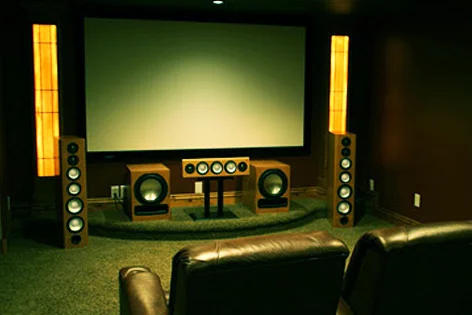
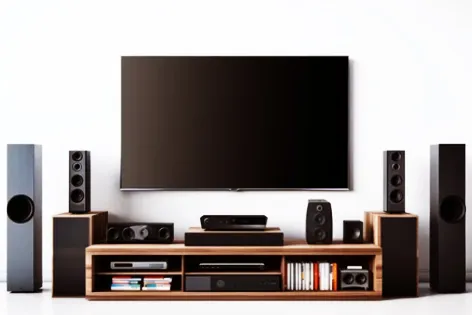
The size of your room plays a pivotal role in determining the type of home theater speakers that will deliver the best audio experience. A spacious room demands speakers with more power and a fuller range to fill the area with sound effectively. If your room is on the smaller side, compact bookshelf speakers might be a more suitable choice, saving space without compromising on quality. On the flip side, larger rooms benefit from the commanding presence of floorstanding speakers, capable of delivering a more robust and immersive audio performance.
It’s not just about volume but also about achieving the right balance and resonance for your space. Consider the dimensions, acoustic treatment / Acoustic Insulation, and layout of your room to make an informed decision about the size and type of speakers that will complement your home theater setup seamlessly. Thus, the first tip on How to Choose the Right Home Theater Speakers is by considering the size of the room.
Click here to learn more about Best Acoustic Panels for Home Theater.
Click here to learn more about 8 Common Acoustic issues and how to solve them.
2. Speaker Type
Choosing the right speaker type is the second crucial tip in building an optimal home theater setup. The variety of speakers available allows you to tailor your system to your specific needs. Floorstanding speakers, with their standalone design, offer a full range of sound suitable for larger rooms. Bookshelf speakers, compact and versatile, are ideal for small home theaters or where space is a consideration. Center channel speakers focus on dialogue and are typically placed above or below the television. Surround speakers create an immersive audio environment.
In addition to these, specialized speakers like Atmos speakers bring a vertical dimension to sound, enhancing the overall experience. Subwoofers handle low frequencies for deep bass, while soundbars provide a space-saving alternative. Each speaker type contributes uniquely to the audio landscape of your home theater. Thus, the second tip on How to Choose the Right Home Theater Speakers is by selecting the right speakers for your specific preferences and room requirements.
Click Here to know more details about the 9 Best Home Theater speaker brands.
Click Here to know more about the 10 Best Subwoofers for Home Theaters
3. Speaker Sensitivity
Speaker sensitivity, the often-overlooked third tip in crafting an exceptional home theater experience, is a critical factor in optimizing your audio setup. Sensitivity refers to a speaker’s efficiency in converting power into sound. Choosing speakers with the right sensitivity ensures that they can deliver impressive audio even with lower-powered amplifiers. High sensitivity speakers require less power to produce the same volume as their lower sensitivity counterparts, making them suitable for various setups.
Understanding the sensitivity of your speakers is essential for achieving the desired audio levels without straining your amplifier. This consideration ensures that your speakers work harmoniously with your audio equipment, contributing to a seamless and powerful home theater experience. Thus, the third tip on How to Choose the Right Home Theater Speakers is to check on speaker sensitivity as well, a key element in optimizing your audio setup.
Click here to read more about How to improve sound quality in Home Theatre
4. Impedance
The fourth tip in the quest for the perfect home theater speakers brings us to the concept of impedance. It’s a crucial factor that often determines whether your speakers and amplifier will harmonize effectively. Impedance, measured in ohms, indicates the resistance a speaker presents to the amplifier. Ensuring compatibility between speaker impedance and amplifier capabilities is vital to prevent potential damage to your equipment.
Matching the impedance of your speakers with that of your amplifier or AV receiver contributes to a smoother and more efficient flow of power, resulting in optimal audio performance. Before making a purchase, checking the speaker impedance is a prudent step to ensure the longevity and compatibility of your home theater system. Thus, the fourth tip on How to Choose the Right Home Theater Speakers is to check on speaker impedance, a key consideration in preserving the health of your audio equipment.
5. Frequency Response
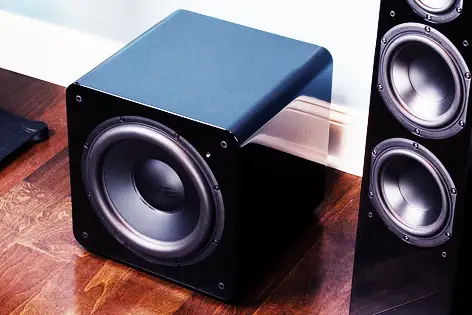
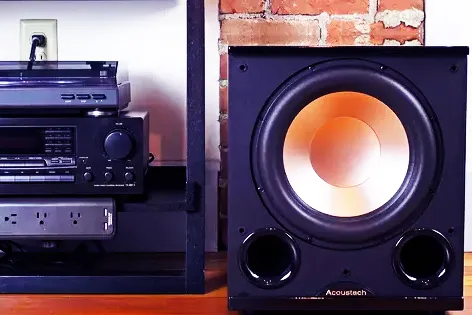
Delving into the intricacies of audio quality, the fifth tip for selecting optimal home theater speakers is to scrutinize the frequency response. This parameter denotes the range of frequencies a speaker can reproduce, encompassing both low and high tones. A broader frequency response ensures a more comprehensive and nuanced sound experience, capturing the subtleties of music, dialogue, and effects.
Consider your entertainment preferences — whether it’s the rumbling bass of an action sequence or the crisp highs of a musical performance. Aligning the frequency response of your speakers with your audio expectations is pivotal for achieving a well-balanced and immersive home theater experience. Thus, the fifth tip on How to Choose the Right Home Theater Speakers is to check the frequency response, a crucial element in crafting an audio setup that resonates with your unique preferences.
6. Brand and Model Reputation
When embarking on the journey to select the perfect home theater speakers, the sixth crucial tip involves considering the brand and model reputation. It’s not just about the technical specifications; the track record of a brand and the performance history of a specific speaker model contribute significantly to your decision-making. Reputable brands often signify a commitment to quality, reliability, and customer satisfaction.
Reading reviews from both experts and users provides valuable insights into the real-world performance of speakers, helping you make an informed choice. A brand with a positive reputation is more likely to deliver on expectations, ensuring a satisfying audio experience for your home theater setup. Thus, the sixth tip on How to Choose the Right Home Theater Speakers is to consider brand and model reputation, a step that adds a layer of assurance to your quest for the perfect audio companions.
7. Budget


Navigating the realm of home theater speakers brings us to the seventh essential tip: budget considerations. While the allure of high-end speakers is undeniable, it’s crucial to establish a realistic budget for your entire home theater system. Allocate your financial resources wisely across speakers, an AV receiver, necessary cables, acoustic treatment, Furnitures etc.
The market offers quality options at various price points, ensuring that you can find speakers that not only meet your audio expectations but also align with your financial constraints. Striking a balance between performance and cost ensures a satisfying investment that enhances your home entertainment without breaking the bank. Thus, the seventh tip on How to Choose the Right Home Theater Speakers is by focusing on the budget as well, a practical consideration that ensures a rewarding and economically sensible audio setup.
8. Compatibility
As we delve into the intricate world of home theater speakers, the eighth tip sheds light on the often-overlooked aspect of compatibility. Ensuring that your chosen speakers align seamlessly with your AV receiver or amplifier is paramount for a harmonious audio setup. Check the power ratings and impedance specifications to guarantee that the speakers and the rest of your equipment work in tandem.
Mismatched components can lead to suboptimal performance and potential damage. This tip emphasizes the importance of a holistic approach, where each element of your home theater system complements the others, creating an immersive audio experience. Thus, the eighth tip on How to Choose the Right Home Theater Speakers is by focusing on compatibility factors, a crucial consideration for the longevity and optimal functionality of your audio setup.
Click here to read more about 8 Best AV Receivers for Home Theatres
9. Listening Preferences
The ninth guiding tip in the pursuit of the ideal home theater speakers is rooted in individual taste – your listening preferences. Understanding and embracing your personal inclinations is key to selecting speakers that cater to your unique audio desires. Some speakers may emphasize certain frequencies, offering a more pronounced bass or crisper treble.
Whether you lean towards a balanced audio profile or prefer speakers that accentuate specific elements, acknowledging your preferences ensures that your home theater system is tailored to provide a truly satisfying experience. This tip encourages a thoughtful consideration of what resonates with you, be it the thunderous beats of action sequences or the nuanced melodies of a musical performance.
Thus, the ninth tip on How to Choose the Right Home Theater Speakers is by considering listening preferences, an integral element in curating an audio setup that aligns with your individual tastes.
10. Audition the Speakers
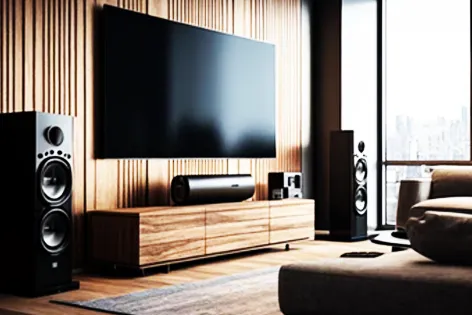
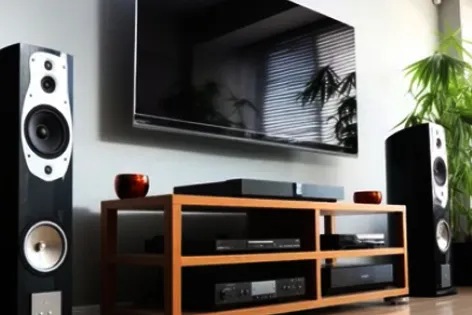
The final and crucial tip in the quest for the perfect home theater speakers emphasizes a hands-on approach: auditioning the speakers. While specifications on paper are informative, there’s no substitute for the experience of listening to the speakers in person. Take the time to visit audio stores, attend demonstrations, or borrow speakers for a trial run. This firsthand experience allows you to assess the speakers’ performance in a real-world setting, ensuring that they meet your expectations for clarity, depth, and overall sound quality.
Pay attention to how the speakers handle different genres, dialogue, and dynamic ranges. By auditioning the speakers, you make an informed decision based on your own ears and preferences. Thus, the tenth tip on How to Choose the Right Home Theater Speakers is by auditioning the speakers, a hands-on step that brings you closer to achieving the optimal audio experience for your home entertainment.
Conclusion
In the intricate world of home entertainment, selecting the right speakers is the cornerstone of creating an immersive and captivating audio experience. From considering room size and speaker types to scrutinizing sensitivity, impedance, and frequency response, each step in choosing home theater speakers is pivotal. Delving into the realm of brand reputation, budget considerations, and compatibility factors ensures a well-rounded decision-making process.
Your individual listening preferences add a personal touch, tailoring the audio setup to meet your unique tastes. Finally, the hands-on experience of auditioning speakers provides the ultimate assurance that your chosen system aligns perfectly with your expectations. Thus, the journey of How to Choose the Right Home Theater Speakers is an exploration, where technical specifications merge with personal preferences.
FAQs (Frequently Asked Questions)
Question: How to Choose the Right Home Theater Speakers?
Answer: Consider your room size and layout. Larger rooms may benefit from floorstanding speakers for a fuller sound, while bookshelf speakers are suitable for smaller spaces. Center channel speakers focus on dialogue, and surround speakers enhance the overall audio experience.
Question: What role does sensitivity play in choosing home theater speakers?
Answer: Sensitivity measures a speaker’s efficiency in converting power into sound. Higher sensitivity speakers require less power to produce the same volume, making them suitable for various setups. Match the sensitivity to your amplifier’s capabilities for optimal performance.
Question: How important is brand reputation when selecting home theater speakers?
Answer: Brand reputation is crucial. Reputable brands often signify a commitment to quality and customer satisfaction. Reading reviews and considering the brand’s track record ensures you invest in speakers that meet performance expectations.
Question: How to Choose the Right Home Theater Speakers on a budget?
Answer: Yes, quality speakers are available at various price points. Allocate your budget wisely across speakers, AV receiver, Projector and accessories. Striking a balance between performance and cost ensures a satisfying investment in your home audio system. Convey the budget to the dealer so that it will help them in making speaker packages in and around your budget. This will not only save your time, but it will also help you in understanding the different options available in the market.
Question: Why is auditioning speakers important in the selection process?
Answer: Auditioning speakers provides a firsthand experience of their performance. It allows you to assess how speakers handle different genres and dynamic ranges, ensuring they meet your expectations for sound clarity and depth. This step is crucial in the journey of How to Choose the Right Home Theater Speakers.
About the Author
Contact us for more details regarding Acoustic Treatment
Address
#6, 10th B Cross, Jayswal Center, KHB Main Road, Kaveri Nagar, Kanakanagar, RT Nagar Post, Bangalore – 560032
Mobile Number
+919008400702
+919945034989
Email Address
anil@jayswalgroup.com
sales@jayswalgroup.com